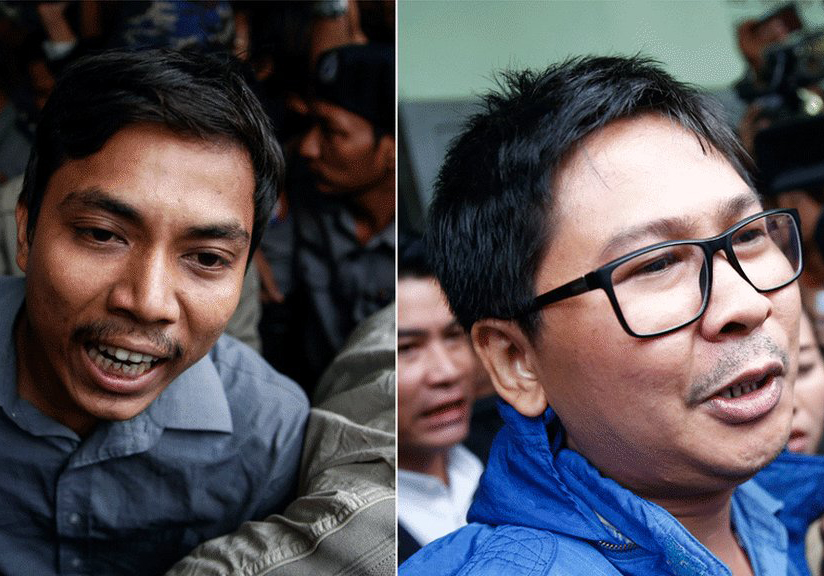
Sep 3, 2018 | News
The Yangon District Court’s decision today to sentence Reuters journalists Wa Lone and Kyaw Soe Oo to seven years’ imprisonment for violating the Official Secrets Act deals a massive blow to human rights and the rule of law in Myanmar, said the ICJ.
“The Court’s decision effectively punishes these two courageous journalists for exposing human rights violations, following a grossly unfair trial,” said Frederick Rawski, Asia Pacific Director for the ICJ.
“The decision is a miscarriage of justice that inflicts needless suffering on them and their families, threatens freedom of expression, damages Myanmar’s global standing, and undermines its justice institutions all at once,” he added.
The ICJ has monitored the case since the journalists’ initial detention in December 2017.
As previously noted by the ICJ, the detention and trial has violated numerous basic fair trial guarantees.
The prosecutors had a duty to drop charges and the judge should have dismissed the case given the lack of evidence and the unlawfulness of detention because of fair trail rights violations.
“The case is emblematic of how the justice system ends up reinforcing rather than challenging military impunity,” said Rawski.
“The result undermines government claims that it can deliver accountability for human rights violations on its own, and does nothing to build trust that justice system can act independently and impartially after emerging from decades of military rule,” he added.
Members of security forces generally enjoy impunity for the perpetration of human rights violations, including for crimes under international law.
The ICJ has previously reported that victims and their families, as well as journalists, often face retaliation for publicizing human rights violations by the military.
Wa Lone and Kyaw Soe Oo were arrested in December 2017, and held incommunicado for nearly two weeks, before being charged under the colonial-era Official Secrets Act for allegedly possessing documents related to the operations of security forces in northern Rakhine State, during “clearance operations.”
The two reporters had been reporting on human rights violations in Rakhine State, including the killing of Rohingya by the military in Inn Dinn Village.
In a report issued just last week, the UN Independent International Fact Finding Mission found that security forces had perpetrated crimes under international law during these operations, including crimes against humanity and possibly the crime of genocide.
The detention and prosecution of anyone, including journalists, based solely on the collection and publication of evidence relevant to serious human rights violations, is a violation of international law and standards on freedom of expression, the right to participation in public affairs and on the role of human rights defenders.
Legal options remaining for the journalists include appealing of today’s decision, and requesting a Presidential amnesty.
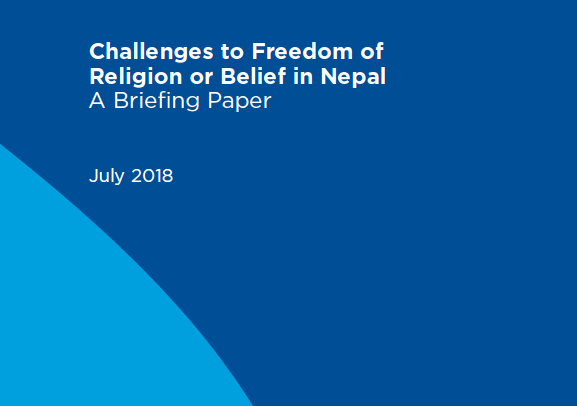
Aug 21, 2018
The ICJ has issued Challenges to Freedom of Religion or Belief in Nepal, in which the ICJ identified a number of challenges related to the protection and promotion of the right to freedom of religion or belief in the country.
These challenges are:
1. the prohibition and criminalization of “proselytism”;
2. criminal offences related to “blasphemy” and “hurting religious sentiment”;
3. discrimination against religious minorities arising from denial of use of burial grounds and cemeteries in and around Kathmandu; and
4. Tibetan Refugees’ exercise of their right to freedom of religion or belief.
In light of concerns detailed in the briefing, and arising in connection with the above-mentioned challenges, the ICJ made a number of recommendations to the authorities of Nepal.
Nepal-Freedom of religion brief-Advocacy-Analysis brief-2018-ENG (full text, PDF)
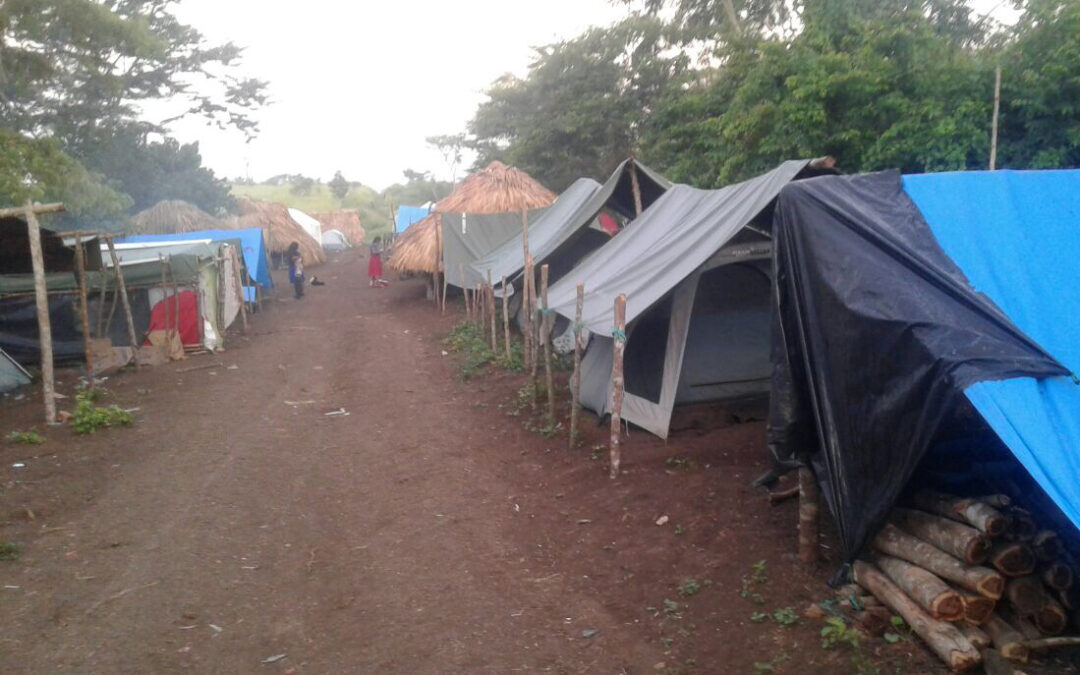
Jul 27, 2018 | News
On 25 July, the ICJ visited the displaced persons of the Laguna Larga community, who were forcibly evicted from their homes over a year ago.
These displaced persons are now living in makeshift tents in infra-human conditions in the El Desengaño community, municipality of Candelaria, State of Campeche on the frontier between Guatemala and Mexico.
Their health and well-being are at serious risk.
On 8 September 2017, the Inter-American Commission on Human Rights (IACHR) granted precautionary measures in favour of the evicted and displaced community of Laguna Larga (Resolution 36/2017 Precautionary Measures No 412-17), calling on the Guatemalan authorities to adopt the “necessary measures to protect the rights to life and to personal integrity of the beneficiaries, through measures designed to improve, among other aspects, their sanitary and health conditions, in particular of children, women and the elderly”.
To date, the Guatemalan authorities have taken no action to implement the precautionary measures.
The ICJ was able to observe that the only measure adopted by the Guatemalan State has been to provide the displaced community with two teachers to give classes to the children.
However, the ICJ could also observe that the educational installations are precarious, too hot and very dark, which makes it difficult to give classes.
No sanitary nor health services have been provided by the Guatemalan authorities. On 24 July, a child died only 30 hours after her birth, seemingly a consequence of lack of medical attention.
Neither have other precautionary measures concerning food, access to water and housing been implemented.
The ICJ is deeply concerned that the Guatemalan State has not fulfilled the requirements of the IACHR and that after a year, the rights to life and personal integrity of the displaced community of Laguna Larga is at risk of irreparable harm.
In the face of the inaction of the Guatemalan authorities, members of the Laguna Larga community with the support of Mexican and Guatemalan organizations have managed to implement various projects to provide drinking water, electricity, food and health services.
However, despite these important efforts, this humanitarian support remains insufficient given the serious crisis.
While the efforts of the Laguna Larga community and Mexican and Guatemala non-governmental organizations have been an example of civil society organization, it in no way exonerates, substitutes or reduces the responsibility of the Guatemalan State to guarantee the rights to life and personal integrity of the displaced population and to implement the precautionary measures ordered by the IACHR.
Ramon Cadena, Director of ICJ’s Central American Office, said:
“Given this situation, the ICJ urges the Guatemalan authorities immediately to fulfil the Inter-American Commission on Human Rights’ precautionary measures 412-17 and to resume the dialogue that was started before the eviction. According to international standards, the State should provide reparations for all the harm and prejudice caused.”
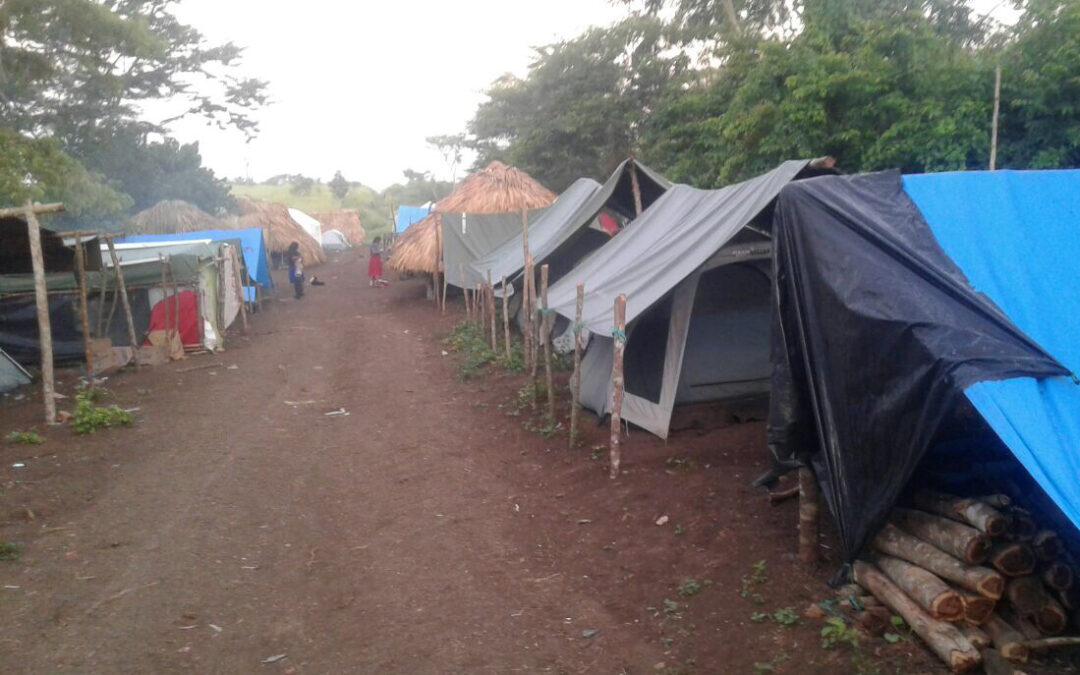
Jul 26, 2018 | Noticias
Falta de atención médica por parte del Estado de Guatemala provoca la muerte de niña, 30 horas después de nacida el 24 de julio.
La CIJ visitó el 25 de julio del presente año a la comunidad de “Laguna Larga”, víctima de desalojo forzoso hace ya más de un año.
Las personas desplazadas, que actualmente viven en la circunscripción de El Desengaño, municipio de Candelaria, Estado de Campeche, a la intemperie en carpas y “champas” en una zona rural de la franja fronteriza entre Guatemala y México, continúan en condiciones inhumanas y en una situación de riesgo, que pone en peligro su vida e integridad.
El 8 de septiembre de 2017, la Comisión Interamericana de Derechos Humanos (CIDH) decretó medidas cautelares a favor de los Pobladores desalojados y desplazados de la comunidad Laguna Larga (Resolución 36/2017, Medidas Cautelares No. 412-17), instando a las autoridades guatemaltecas a adoptar las “medidas necesarias para proteger los derechos a la vida y la integridad personal de las personas beneficiarias, a través de medidas dirigidas a mejorar, entre otros aspectos, las condiciones sanitarias y de salud, en especial de los niños, niñas, mujeres y personas mayores”.
Hasta la fecha las autoridades guatemaltecas no han acatado las medidas cautelares.
La CIJ pudo constatar que la única medida adoptada por el Estado de Guatemala ha sido la asignación a la comunidad desplazada de dos maestras para impartir clases a los niños.
No obstante, la CIJ pudo constatar igualmente que las instalaciones educativas son precarias y demasiado calientes y obscuras, lo cual dificulta la impartición de clases.
Ninguna medida de orden sanitario o en materia de salud ha sido implementada por las autoridades guatemaltecas.
El pasado 24 de julio, una niña murió apenas treinta horas después de nacida, aparentemente, por falta de atención médica.
Igualmente ninguna de las medidas cautelares relativas a la alimentación, acceso al agua potable y vivienda, ha sido atendida por las autoridades guatemaltecas.
La CIJ expresa su honda preocupación por el hecho de que el Estado de Guatemala no haya cumplido ninguno de los requerimientos de la CIDH y que, después de un año, los derechos a la vida e integridad personal de los pobladores desplazados de la Comunidad Laguna Larga se encuentren en una situación de gravedad y urgencia de riesgo de un daño irreparable.
Ante la inacción de las autoridades guatemaltecas, los miembros de “Laguna Larga”, con el apoyo de organizaciones no gubernamentales, tanto mexicanas como guatemaltecas, han logrado implementar varios proyectos para abastecerse de agua potable, energía eléctrica, alimentación y salud.
No obstante, la CIJ pudo constatar que toda esta importante ayuda humanitaria que “Laguna Larga” ha recibido de parte de la sociedad civil, resulta insuficiente dada la gravedad de la crisis.
Si bien el esfuerzo y el trabajo desplegado por los miembros de la Comunidad de “Laguna Larga” y las organizaciones no gubernamentales guatemaltecas y mexicanas, constituyen un ejemplo de organización y participación de la sociedad civil, ello en modo alguno exonera, sustituye o disminuye la responsabilidad del Estado guatemalteco de garantizar los derechos a la vida y la integridad personal de la población desplazada y de implementar las medidas cautelares decretadas por la CIDH.
La CIJ concluye que toda esta falta de respuesta por parte de las autoridades en todos los ámbitos de la medida cautelar de la CIDH, constituyen actos y tratos inhumanos, crueles y degradantes, que afectan gravemente la dignidad del ser humano y que han causado daños irreparables a los miembros de la comunidad “Laguna Larga”.
Ramón Cadena, Director de la CIJ para Centroamérica expresó:
“Ante toda esta situación, la Comisión Internacional de Juristas demanda que las autoridades del Estado de Guatemala cumplan con la medida cautelar 412-17 de la Comisión Interamericana de Derechos Humanos de forma inmediata, para evitar más daños a la comunidad “Laguna Larga” y que se retome el diálogo iniciado antes del desalojo. Según los estándares internacionales, el Estado deberá reparar todos los daños y perjuicios causados.”
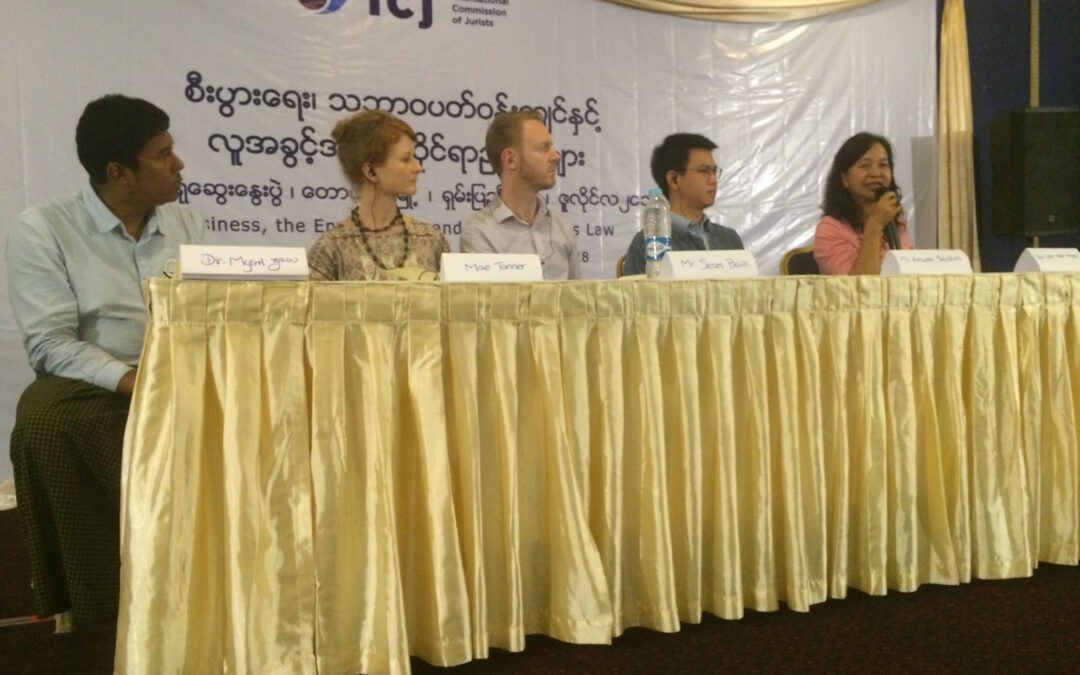
Jul 24, 2018 | Events, News
On 22 and 23 July the ICJ convened a workshop on Business, the Environment and Human Rights Law in Taunggyi, the capital of Myanmar’s Shan State.
This followed meetings between the ICJ’s legal advisers and the Shan State High Court and also with the State Advocate General on 13 July, to discuss rule of law developments.
The workshop aimed to identify ways to address the impacts of business activities on human rights and the environment, through legal advocacy including strategic litigation, and to provide a forum for cooperation and experience sharing among participants.
More than 50 lawyers, parliamentarians, human rights defenders and civil society representatives attended from Shan, Kayah and Mon states – provinces that together border Thailand, Laos and China.
An overview of the investment context was provided by Dr Myint Zaw of Paung Ku Myanmar, who also shared lessons from environmental activism in Myanmar.
As well as highlighting weaknesses in domestic law and policy, he presented concerns around lack of transparency and information sharing between the legislature and executive branches of government.
Australian lawyer and ICJ consultant Mae Tanner gave an overview of international human rights law and standards relevant to business activities and environmental protection, particularly emphasizing the obligations assumed by Myanmar in ratifying the International Covenant on Economic, Social and Cultural Rights.
She offered insights as to how UN mechanisms can be used by civil society to advance their advocacy on business and human rights in Myanmar.
Senior Advocate U Myint Thwin drew on his extensive litigation experience to share perspectives on the complex and confusing array of land laws in Myanmar and emphasized the importance of legal knowledge and training to combat corruption and achieve accountability.
The ICJ’s legal adviser Mr Sean Bain outlined the domestic laws relevant to investment and environmental protection in Myanmar and highlighted some key provisions that offer protection against human rights violations and abuses.
He noted the government’s stated aim of promoting the rule of law in Myanmar and emphasized the importance of demanding accountability, transparency and justice in this context.
Amarin Saichan, lawyer with Thai NGO EnLAW, shared experiences of pursuing strategic litigation to address unlawful and harmful business activities in Thailand, stressing the need for creativity in using the law to seek justice and accountability.
He also raised concerns around the use by government of strategic litigation against public participation in Thailand and explained how Thai lawyers are using the courts to guarantee the right protest against harmful development projects.
Participants had the opportunity to discuss how the strategies they shared could be used in the context of issues faced by their communities.
These included human rights and environmental concerns raised by energy and extractive projects, restrictions on shifting agriculture, and violations of the right to freedom of expression and assembly faced by communities who oppose state-backed developments.
They considered advocacy strategies for four case studies selected by participants from across Shan, Kayah and Mon states.
Throughout the workshop speakers and participants highlighted the importance of cooperation between civil society and lawyers, and the need to use Myanmar’s legal system more proactively as part of their broader advocacy strategies.
This workshop is part of the ICJ’s ongoing support to lawyers and civil society in Myanmar.









